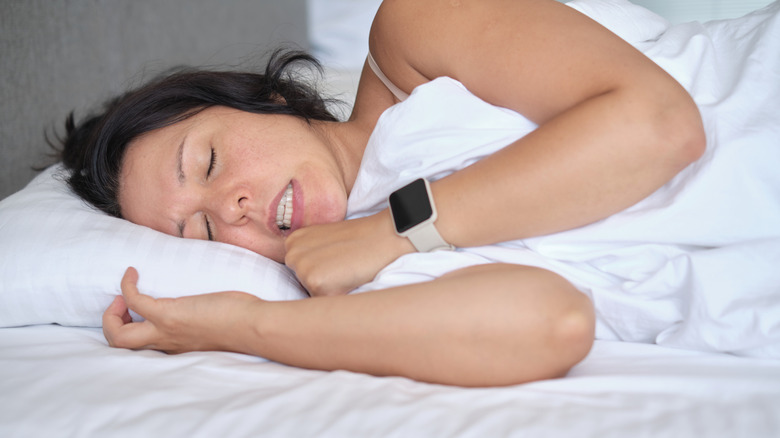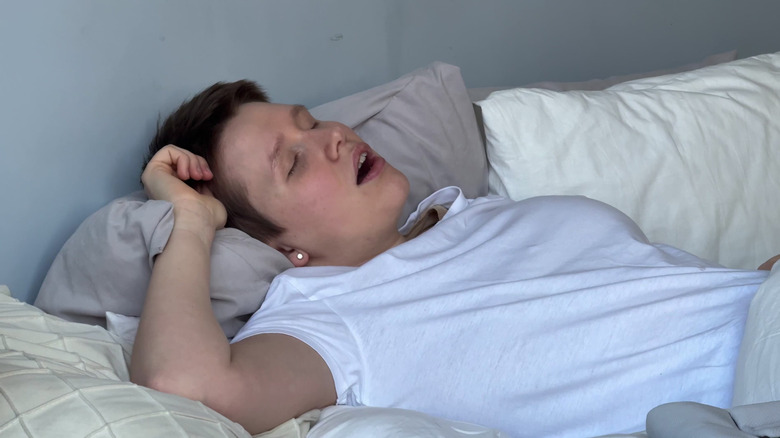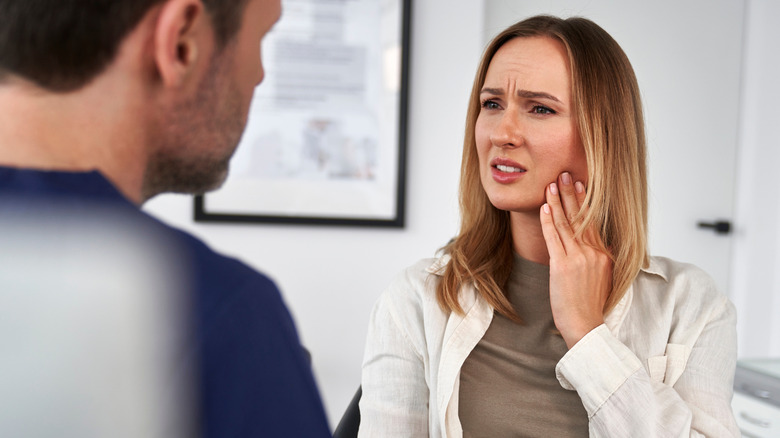The Unexpected Link Between Teeth Problems And Sleep Disorders
Getting enough sleep each night is one of the pillars of good health. But for up to 70 million people in the United States, sleep doesn't come so easily, according to the National Heart, Lung, and Blood Institute. Insomnia is the most common sleep disorder, but there are more than 80 types out there. And some you might not even realize you have unless someone else points them out.
Your partner might notice signs of a sleep disorder, but your dentist could spot one, too. The National Institute of Dental and Craniofacial Research says flattened or chipped teeth could be a sign of sleep bruxism, which means you're grinding your teeth at night. Bruxism can also wear down your tooth enamel or make your teeth more sensitive. Your dentist might also check if your jaw feels sore or tight.
Even though sleep bruxism is considered a sleep-related movement disorder, it might also be a sign of obstructive sleep apnea. A 2019 study in the Journal of Clinical Medicine found a strong connection between sleep bruxism and mild to moderate sleep apnea. Interestingly, sleep bruxism isn't linked with more severe sleep apnea.
How teeth grinding and sleep apnea may be related
Sleep bruxism might seem like a minor issue, but your dentist would probably disagree. When your jaw clenches down at night, you can put up to 250 pounds of pressure on your teeth (per the Sleep Foundation). That kind of force can crack fillings or even break teeth. If left untreated, bruxism can lead to tooth loss and possible infections. Over time, you might end up needing painful and expensive dental work to fix damage to your teeth or jaw (per Stonewalk Family Dentistry).
So how could teeth grinding be connected to sleep apnea? A 2015 article in Sleep and Breathing laid out a few possibilities. First, they might not be connected at all. It's not uncommon for people to have more than one sleep disorder. Second, someone could develop sleep apnea first, and the grinding might be the body's way of trying to reopen a blocked airway. The third possibility is that bruxism starts first, and sleep apnea comes later. According to the Sleep Foundation, this might happen because the nerve signals that trigger teeth grinding can also lead to nasal congestion, which makes it harder to breathe. However, research shows that cases where teeth grinding is followed by a sleep apnea episode are less common.
How to handle your teeth grinding and sleep apnea
If your dentist points out cracked or flattened teeth, it's worth digging into what's causing your bruxism. Stress is one of the major risk factors, and you might not even realize you're clenching your teeth during stressful moments. Carrying that stress and anxiety into bedtime can lead to teeth grinding while you sleep. Certain medications like selective serotonin reuptake inhibitors (SSRIs) may also raise your risk of bruxism, so it's a good idea to check with your doctor or pharmacist about possible side effects. Lifestyle habits like smoking and drinking alcohol are linked to bruxism too, and they're also risk factors for sleep apnea. Family history can also play a role in both conditions.
A sleep study can give you a clear diagnosis of sleep apnea, or other sleep issues, but these can be quite expensive. Your dentist might suggest wearing a bite guard at night to help protect your teeth. If you think stress might be behind your bruxism, focusing on sleep hygiene and relaxation techniques could help. Cognitive behavioral therapy for insomnia (CBT-I) is another option that can ease stress and improve sleep. And if your bruxism is causing jaw pain or headaches, a physical therapist might be able to show you some exercises that offer relief.


